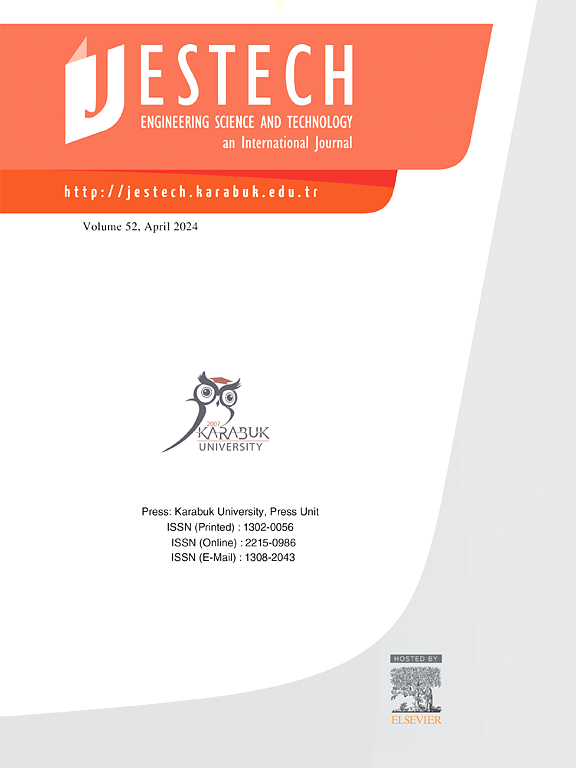优化具有抽水蓄能的多目标混合能源系统,提高可再生能源集成的稳定性和效率
IF 5.1
2区 工程技术
Q1 ENGINEERING, MULTIDISCIPLINARY
Engineering Science and Technology-An International Journal-Jestech
Pub Date : 2025-07-17
DOI:10.1016/j.jestch.2025.102142
引用次数: 0
摘要
可再生能源包括间歇性,这是一个重大挑战,造成相当大的风能和太阳能损失。为了解决这一问题,本文提出了一种混合能源生产系统多目标优化分配的新方法。该系统由水电、风能、太阳能和热能组成,由抽水蓄能推动。研究的主要目的是通过大规模的可再生能源整合,最大限度地减少电力波动的影响。该优化策略包含了水电站方面的一系列复杂约束,其中抽水蓄能提供了精确的灵活性。该策略旨在提高混合生产系统的整体效率和可靠性。这种有效的策略包含固有的复杂性,由NSGA-II算法求解。优化过程的多目标方法执行帕累托解集,反映了剩余负荷变化和运行成本之间的权衡。因此,采用带有CRITIC权重的promehee - gaia方法来确定最理想的解决方案。不同可再生能源的整合提供了对系统对各种条件的动态响应的见解。值得注意的是,研究结果强调了在混合能源系统中分配抽水蓄能的巨大影响,展示了其显著降低运营成本和负荷波动的潜力。这些发现为抽水蓄能的实际实施提供了希望,以解决与整合可再生能源相关的挑战,从而有助于电网的稳定性和整体弹性。本文章由计算机程序翻译,如有差异,请以英文原文为准。
Optimizing multi-objective hybrid energy systems with pumped hydro storage for enhanced stability and efficiency in renewable energy integration
Renewable energy sources include the intermittent nature, which is a vital challenge that causes considerable wind and solar energy losses. To address this challenge, this paper introduces a new approach for the optimal multi-objective distribution of a hybrid energy production system. The proposed system comprises hydropower, wind, solar, and thermal energy, which is boosted by pumped hydro energy storage. The investigation primary aim is minimizing the electricity fluctuations’ impact through the renewable enegy sources integration in the large scale. The optimization strategy encompasses a series of complex constraints in term of hydropower plant, in which pumped hydro energy storage provides an accurate flexibity. This stragey aims to improve the overall efficiency and reliability of the hybrid production system. This efficient strategy consists of the inherent complexities, which is solved by the NSGA-II algorithm. The multi-objective approach of optimization procedure performs Pareto solution sets that reflects trade-offs between remaining load variations and operational costs. Therefore, the PROMETHEE-GAIA Method with CRITIC weighting is used to identify the most desirable solutions. The integration of different renewable energy sources provides insights into the dynamic response of the system to various conditions. Significantly, the results emphasize the considerable impact of allocating pumped hydro energy storage in the hybrid energy system, showcasing its potential to significantly reduce operational costs and load fluctuation. These findings are promising for the practical implementation of pumped hydro energy storage in addressing challenges associated with integrating renewable energy sources, thereby contributing to the stability and overall resilience of the power grid.
求助全文
通过发布文献求助,成功后即可免费获取论文全文。
去求助
来源期刊

Engineering Science and Technology-An International Journal-Jestech
Materials Science-Electronic, Optical and Magnetic Materials
CiteScore
11.20
自引率
3.50%
发文量
153
审稿时长
22 days
期刊介绍:
Engineering Science and Technology, an International Journal (JESTECH) (formerly Technology), a peer-reviewed quarterly engineering journal, publishes both theoretical and experimental high quality papers of permanent interest, not previously published in journals, in the field of engineering and applied science which aims to promote the theory and practice of technology and engineering. In addition to peer-reviewed original research papers, the Editorial Board welcomes original research reports, state-of-the-art reviews and communications in the broadly defined field of engineering science and technology.
The scope of JESTECH includes a wide spectrum of subjects including:
-Electrical/Electronics and Computer Engineering (Biomedical Engineering and Instrumentation; Coding, Cryptography, and Information Protection; Communications, Networks, Mobile Computing and Distributed Systems; Compilers and Operating Systems; Computer Architecture, Parallel Processing, and Dependability; Computer Vision and Robotics; Control Theory; Electromagnetic Waves, Microwave Techniques and Antennas; Embedded Systems; Integrated Circuits, VLSI Design, Testing, and CAD; Microelectromechanical Systems; Microelectronics, and Electronic Devices and Circuits; Power, Energy and Energy Conversion Systems; Signal, Image, and Speech Processing)
-Mechanical and Civil Engineering (Automotive Technologies; Biomechanics; Construction Materials; Design and Manufacturing; Dynamics and Control; Energy Generation, Utilization, Conversion, and Storage; Fluid Mechanics and Hydraulics; Heat and Mass Transfer; Micro-Nano Sciences; Renewable and Sustainable Energy Technologies; Robotics and Mechatronics; Solid Mechanics and Structure; Thermal Sciences)
-Metallurgical and Materials Engineering (Advanced Materials Science; Biomaterials; Ceramic and Inorgnanic Materials; Electronic-Magnetic Materials; Energy and Environment; Materials Characterizastion; Metallurgy; Polymers and Nanocomposites)
 求助内容:
求助内容: 应助结果提醒方式:
应助结果提醒方式:


